| Reviews & Columns |
|
Reviews DVD TV on DVD Blu-ray 4K UHD International DVDs In Theaters Reviews by Studio Video Games Features Collector Series DVDs Easter Egg Database Interviews DVD Talk Radio Feature Articles Columns Anime Talk DVD Savant Horror DVDs The M.O.D. Squad Art House HD Talk Silent DVD
|
DVD Talk Forum |
|
|
| Resources |
|
DVD Price Search Customer Service #'s RCE Info Links |
|
Columns
|
|
|
Kansas City Bomber (Warner Archive Collection)
"Man, let's skate this thing for real."
Grimy, relentlessly downbeat actioner/drama, far better than its rep indicates, with Raquel's first really accomplished performance. Warner Bros' Archive Collection of hard-to-find library and cult titles has gone back to the WB's out-of-print vault and re-released Kansas City Bomber, the 1972 roller derby epic from Metro-Goldwyn-Mayer, starring Raquel Welch, Kevin McCarthy, Helena Kallianiotes, Norman Alden, Jeanne Cooper, and Mary Kay Pass. A relative flop with the public and critics at the time of its release, Kansas City Bomber hasn't developed even minor cult status since then, registering only brief (and usually derisive) recognition of merely its title, subject matter, and star with the viewers familiar with that era of moviemaking. Too bad, that...because it's an effective, evocative little melodrama, anchored by an excellent turn from "the hottest thing on wheels," Raquel Welch. Nothing's changed here from WB's 2005 DVD release (just an original trailer included as a bonus), so no need to double-dip if you already own that disc. A sharp anamorphic transfer is welcome here.
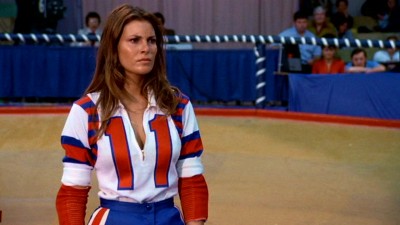
Statuesque single mother Diane "K.C." Carr (Raquel Welch) is the queen of the Kansas City Bombers roller game team, but she isn't long for the plains of Missouri. After "losing" (?) a winner-take-all grudge match with teammate Big Bertha Bogliani (Patti "Moo Moo" Cavin), K.C. is traded to the Portland Loggers, owned by smooth operator Burt Henry (Kevin McCarthy). McCarthy has been watching Diane for months now with the notion of grooming her as the lead bomber in his soon-to-be launched roller franchise in Chicago. Making no bones about wanting to date her, an offer the perpetually dazed, exhausted K.C. accepts without complaint, Henry tells K.C. that after her build-up in Portland, she's going to be a big star once they move to Chicago, what with a national television deal in the works, as well. He also promises that she can bring along her estranged kids, Walt (Stephen Manley) and Rita (Jodie Foster), who live with her disappointed mother (Martine Barlett). Prior to Burt's attentions, K.C.'s arrival at the Loggers's locker room wasn't nearly as welcoming; the rest of the girls already thought she had an "in" with Burt, while boozy, depressive, violent team captain (six years and running out) Jackie Burdette (Helena Kallianiotes), views the beautiful, younger K.C. with contempt...like she does everyone else. Only kindly Lovey (Mary Kay Pass) makes friends with K.C., even offering her a berth at her houseboat. However, when Lovey is unceremoniously traded by Henry, K.C. begins to wonder just what kind of deal she's gotten into by dating Henry, with all her personal and professional tensions culminating in a final do-or-die death match with Jackie.
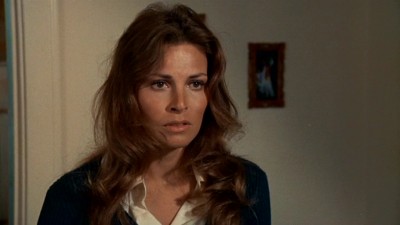
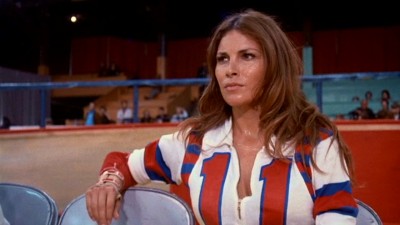
As a kid, I clearly remember the promo blitz that was pushed out there for Kansas City Bomber, with pictures of Raquel in her iconic blue roller derby outfit, center zipper bursting at the seams, frequently popping up (and out!) in magazines and on television (I think my brothers, roller derby fans like myself and every other kid in the early 70s, may even have had a poster of "K.C." up on their bedroom wall). The fact that that campaign didn't translate into boffo box office isn't too surprising today when you realize how many elements were working against the movie's success. Despite the popularity of roller derby on television, roller derby at the arenas, at the local level, was dying out fast by 1972; just a year after Kansas City Bomber premiered, Jerry Seltzer, the son of Roller Derby's founder, Leo, folded up the entire enterprise due to a variety of negative economic factors (click here to read my review of that great roller derby DVD set, The Roller Derby Chronicles, which gives a more thorough run-down on that sport/company's history and demise). As well, why whould the quickly dwindling fans of roller derby shell out good dough at the movie theater to see what they could already get for free on TV? Unfortunately, at this point in her movie career, Raquel Welch headlining a movie wasn't a guarantee of "asses in the seats." The hits she had at the box office came with bigger co-stars attached, while her efforts to "carry" a picture--Fathom, Flareup, Hannie Caulder, and the disastrous Myra Breckinridge--were unsuccessful (and frankly, the PG-rating here didn't exactly help at the drive-ins, either, with the promo build-up and grungy subject matter promising much more than discreet Welch would ever show on screen--just check out her frustratingly tame shower scene here). Add to that the almost oppressively downbeat feel to Kansas City Bomber, giving roller derby fans--probably the only ones who were going to show up to this, anyway--a decidedly negative take on the sport, and you didn't need the already sniffing, sneering critics ("Raquel Welch in a roller derby movie???") to depress the box office take.
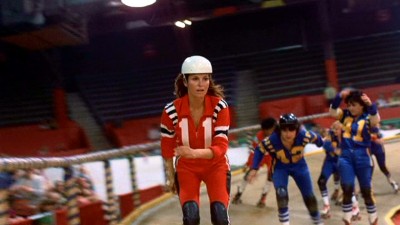
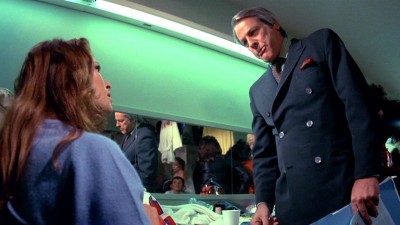
It's a pity, then, that the entertaining, well-made Kansas City Bomber hasn't received much of a fair shake since then, being largely M.I.A. from repeat showings on TV screens since the mid-70s, and having no official video release (that I can remember) until 2005's disc. Whether it's the scruffy subject matter or its tiny budget or the unglamorous way it was filmed, Kansas City Bomber has this undeserved rep as some kind of no-talent, shabby little drive-in flick that came out of nowhere and somehow sneaked into theaters. However, the movie's behind-the-scenes talent was far from low-rent: Martin Elfand (Dog Day Afternoon) produced it; Thomas Rickman (The Laughing Policeman, Coal Miner's Daughter, Everybody's All-American) and Calvin Clements, Sr. (lots of solid episodic TV from the 50s and 60s, Firecreek) scripted it, from a story by Barry Sandler (The Duchess and the Dirtwater Fox, Crimes of Passion); cinematographer Fred J. Koenekamp (Patton, Billy Jack, Papillion, The Towering Inferno) lensed it; and editor David Berlatsky (The Last Movie, Hickey & Boggs, Pat Garrett & Billy the Kid cut it. Only frequent TV director Jerrold Freedman's name probably doesn't ring a bell, but his work here is quite good, giving Kansas City Bomber a coarse, contemplative, mordant tone that's quite unexpected from anything promised on that sexy exploitation one-sheet poster. I've often thought that if the exact same movie had been delivered by a foreign director, the easily-impressed critics would have magically taken Kansas City Bomber into their arms as an "outsider's trenchant view of a slice of America's crumbling society." (others movie makers clearly found Kansas City Bomber valuable, prior to making their better-known sports movies: in the similar-feeling Slap Shot, George Roy Hill ripped-off exactly Freedman's tracking shot of the skaters listening to the national anthem, while Rollerball's Norman Jewison lifted that remarkable opening shot of Welch's skates, isolated in darkness, rolling out into the arena...as well as Bomber's exciting finale).
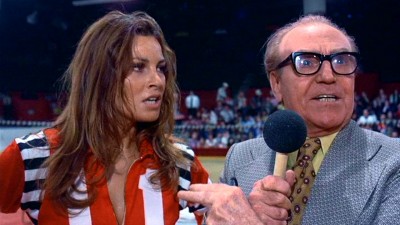
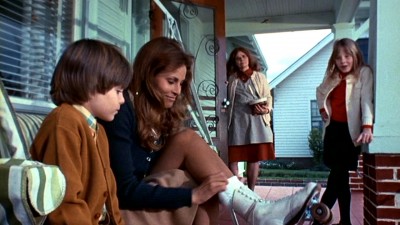
That dichotomy of expectation and execution, along with Welch's unexpectedly skilled performance, is Kansas City Bomber's most intriguing element. If you've ever seen that excellent cinema verite doc, Derby, then you'll recognize how close Kansas City Bomber comes to capturing the dirty, sweaty, smelly, loud, coarse, physically painful world of roller derby. Everything here is deglamorized, from the ugly sets (cheap paneling and cinder block and murky and/or garish lighting), to the screaming fans (true to reality at the time, a meager number of fans populate the stands), to the brutal game play (the scenarios were mostly pre-determined, but the bruises for the skaters were real), to the tension-filled life of a local "celebrity" roller derby skater (will I get traded? Will I get bashed in the brains? Where's the money? When's the day coming when I'm too old to play?). In all the reviews I've read about Kansas City Bomber, the most common thread running throughout is a complaint that the movie doesn't explain how the game is played...as if that's what the movie is really about: roller derby. However, at the very start of the movie, legendary color commentator Richard Lane gives a quick run-down of the rules, so that so-called confusion shouldn't be a factor...if you're listening.
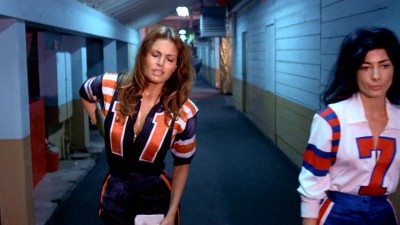
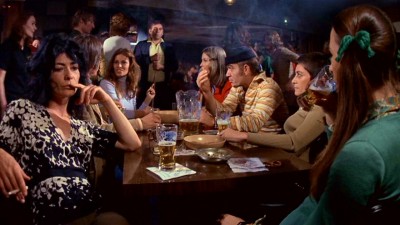
As to the other frequent complaint about Kansas City Bomber from reviewers who weren't sure if and when the skaters were actually fighting or playing along with pre-determined scenarios...I rather like that fuzziness of perception that's created here--it perfectly matches the rabid fans' own schizo take on this entertainment/"sport": is it real...or not? Many of these writers take it as some kind of post-production screw-up that director Freedman doesn't spell it all out on what's reality and what isn't here...and maybe that's true. You have to remember at the time that micro-managiong M-G-M prez James Aubrey was personally cutting everything that went out with Leo the Lion's logo, much to the fury and disgust of moviemakers like Sam Peckinpah and Brian G. Hutton and Herbert B. Leonard and Blake Edwards and Bruce Geller, who all were quoted stating "the smiling Cobra" eviscerated their movies into incomprehension. I'd like to think, though, that there are enough clues in Kansas City Bomber to indicate Freedman and his scripters were well aware of the hazy reality they were creating. When Welch gets her ass beat by Patti "Moo Moo" Cavin in the movie's opening, does she already know she's being traded? Probably, since she's shown at the end of the movie being clued-in by McCarthy that she's to win the final grudge match with Jackie. However...McCarthy is ambivalent about whether or not Jackie definitely knows that fact...so maybe Raquel didn't know what the outcome would be of her first fight with "Moo Moo." Hard-as-nails Jeanne Cooper gives shit to Raquel when she "showboats" an improvised bit with a mop and backward teammate, "Horrible Hog" Hank Hopkins (Norman Alden), indicating that Cooper scripts or at least okays all the fight scenarios...and yet Cooper has no idea what Welch and Kallianiotes are up to when they really start bashing each other with abandon later on, on the rink. Alden's final flip-out at the hands of rowdy fans screaming "Soo-eeee!" and throwing garbage at him, is completely up for grabs as to whether its "color" play to satisfy owner McCarthy, or real psychosis (the other team beats him up for real when Alden viciously attacks one of their own...only to have Alden croak to Raquel, his face bloodied, "I guess they [the fans] got their money's worth tonight."). Bad editing or deliberate obfuscation, that pleasingly off-putting effect wakes you up time and again in ways you don't expect from a movie like Kansas City Bomber.
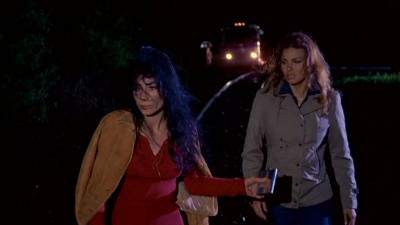
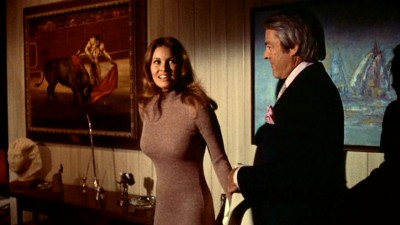
As to that finale, and everyone's problem with its supposedly frustrating, inconclusive, "open ending," I'm not sure what they were watching...because it's perfectly clear what the moviemakers are going for here. Throughout the movie, Welch's character is set-up to be merely a stooge who reacts to whatever life/job situation is presented to her. Reflecting her actions on the rink, her personal life is a series of "jams" that batter her far more brutally than anything that happens during game time: divorced, with the father of her children completely absent; abandoned kids who don't even know her (her daughter calls her "K.C.," not "Mom," while her silent, distant son literally runs away from her); a mother who openly ridicules her lifestyle; no prospects back home (her mother badgers K.C. to marry her rich ex-boss, as if that's the answer to K.C.'s problems); no prospects for the future once she's too old to skate; violent fans that want to rape her; co-workers that hate her; a manipulative boss she "pleases" for lack of any other prospects; her best friend traded because she's "in the way" with her controlling boss; her misguided efforts to befriend Horrible Hank, which lead to his downfall; and her continually rebuffed efforts to reach out to determinedly unresponsive Jackie. Pretty grim, and through it all, Welch pulls out a performance that's both tough and remarkably exposed. She's flat-out hilarious when she perfectly imitates the phony trash-talk that was de rigueur for those wonderfully broad, comical derby skaters' TV interviews. Watch Welch's concentration as she impatiently snaps that gum while the anthem plays--Jimmy Caan would do the same thing in Rollerball three years later--and crack up when she headlocks her interviewer; she's clearly having a lot of fun doing these scenes, and she pulls them off without a hitch. Just as adeptly, she's wonderfully vulnerable when she stumbles through most of the movie as if she's both physically and emotionally spent, creating a portrait of an enervated, neurasthenic single woman/mom that deserves attention from critics on the look-out for feminist roots in cinema. This wasn't a "Raquel" anyone was used to seeing in 1972.
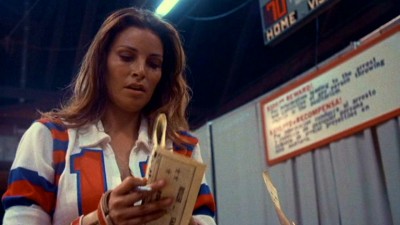
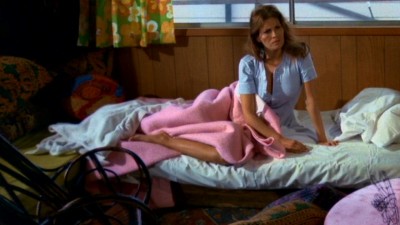
So when K.C. finally figures it out that Burt really has no intention of being the kind of lover she needs (he's pretty smooth about backtracking on his promise to bring her kids along to Chicago--the last straw that convinces K.C. he's only in this relationship for himself), the final grudge match between K.C. and Jackie becomes a show of force to reassert determination of her own life--on her terms. All through Kansas City Bomber, we identify and feel for K.C., and hope that something, anything, will lead her out of this squalid derby life. So when Burt offers the final grudge match for the fans' pleasure, and as a ticket to the "good life" for K.C., we're pretty sure K.C. will take it--even though Burt openly acknowledges everyone is "used" in life for something--because of the promise of more money, more fame, and more Burt, in swank Chicago. However, after seeing a cold Burt kick and brutalize a defenseless, out-of-control Hank, and listening to his suggestion that she leave her kids behind for awhile as he manufactures her new image in Chicago, she finally realizes nothing much is going to be different for her in Chicago with yet another manipulative man controlling her life (earlier, a numb K.C. stares off into space and laments of unfeeling, dismissive Burt, "You have't heard anything I've said,"). SPOILER ALERTS! Burt's scenario calls for K.C. to lose the match, and leave Portland forever, but K.C. fights back and wins the match (uncompromising, too, in that she finally gives up helping Jackie and just kicks her ass), screwing Burt over the only way she can, while reasserting her power over her life the only way she can: on the rink (the look of cold resignation on McCarthy's face as he leaves the auditorium says it all). What's "open-ended" and "unsatisfying" and "inconclusive" about that? Had Freedman included some kind of lame wrap-up with K.C. and Burt or with her kids, it would have been an unnecessary, anticlimactic tie-up for the sake of spelling out what we already know from those final images of K.C. triumphantly skating around the track, with the finish line ribbon in her hands: for one moment at least, she's the best, and she's in control of her life, and herself. Nobody else.
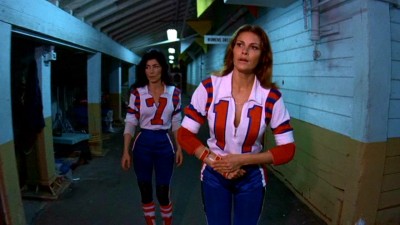
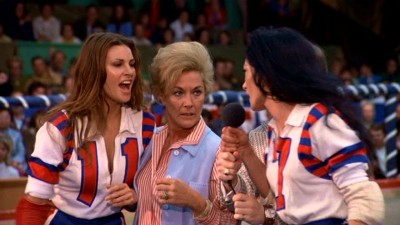
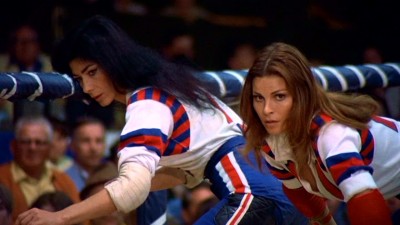
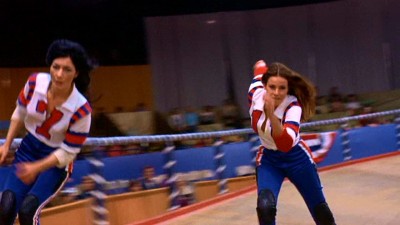
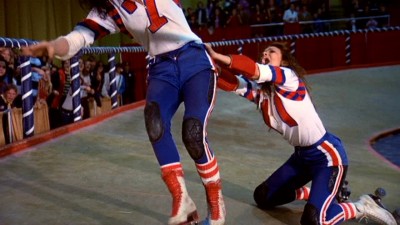
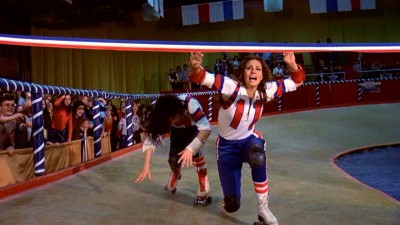
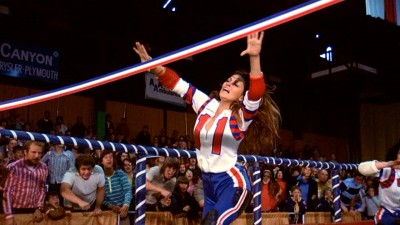
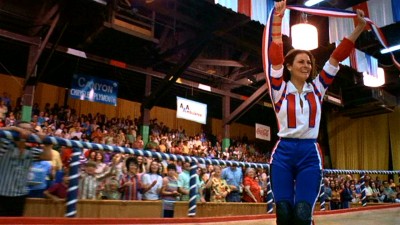
The DVD:
The Video:
Presented in an anamorphically enhanced, 1.85:1 widescreen transfer, Kansas City Bomber looks about right, with a sharpish image, murky, dull color (the movie's original look), some grain (also originally there), and fairly good contrast. Nice.
The Audio:
The Dolby Digital English mono audio track is fine, with a healthy re-recording level, and little hiss. English, French, and Spanish subtitles are available.
The Extras:
And original trailer is included here.
Final Thoughts:
Not the "hottest thing on wheels," but "the singularly most depressing thing on wheels"...until that perfectly realized ending. Woefully neglected (and mostly misunderstood, then and now), Kansas City Bomber is a real find: a grimy little actioner that's both incisive and intriguingly hazy, perfectly documenting a long-lost, sordid milieu, while giving Raquel Welch a chance to show just how good she could be with the right material. I'm highly, highly recommending Kansas City Bomber.
Paul Mavis is an internationally published movie and television historian, a member of the Online Film Critics Society, and the author of The Espionage Filmography.


|
| Popular Reviews |
| Sponsored Links |
|
|
| Sponsored Links |
|
|
| Release List | Reviews | Shop | Newsletter | Forum | DVD Giveaways | Blu-Ray | Advertise |
|
Copyright 2024 DVDTalk.com All Rights Reserved. Legal Info, Privacy Policy, Terms of Use,
Manage Preferences,
Your Privacy Choices | |||||||














